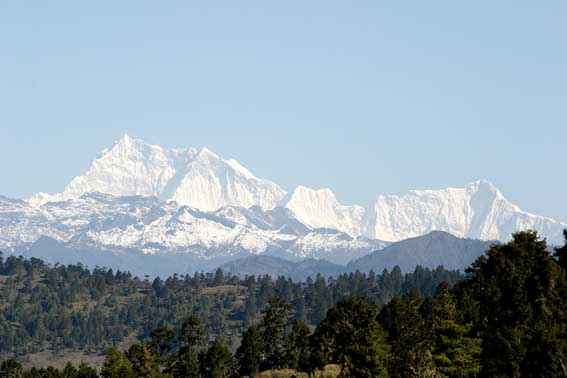One of the pillars of development strategies is environmental conservation. Bhutan is one of the ten global biodiversity hotspots in the world and its policies are actively pro-environment. The Constitution of the Kingdom of Bhutan mandates that sixty percent of its land should have forest coverage for all times to come. At present, it has forest coverage of approximately seventy-two percent.
Geographically, the country can be divided into three zones:
- Alpine Zone (4000m and above) with no forest cover
- Temperate Zone (2000 to 4000m) with conifer or broadleaf forests
- Subtropical Zone (150m to 2000m) with Tropical or Subtropical vegetation
Bhutan has a wide range of vegetation ranging from fir, mixed conifer, blue pine and chir-pine forests to broadleaf and tropical lowland forests. Almost sixty percent of the plant species found in the eastern Himalayan region are present in Bhutan.
 Bhutan boasts of about three hundred species of medicinal plants and about forty-six species of rhododendrons.
Bhutan boasts of about three hundred species of medicinal plants and about forty-six species of rhododendrons.
Rare and endangered animals are spotted frequenting the dense jungles and high mountains. A few of them are the snow leopard and bengal tiger that are found at altitude ranging 3000-4000 meters. Other wildlife include the red panda, goral and langur, himalayan black bear, sambar, wild pig, barking deer, blue sheep and musk deer.
The one-horned rhinoceros, elephant, water buffalo and swamp deer can be found in the tropical forests of southern region. The Golden langur is a species of monkey that is unique to Bhutanese.
A great variety of bird species, with a record number over six hundred and seventy is prevalent. It is also home to about sixteen bird species that are endangered worldwide including the white bellied heron, pallas fish eagle and blyth’s king fisher. Phobjikha valley in Wangduephodrang and Bomdeling in Trashiyangtse are also two important winter roosting locations for the rare black necked cranes.
The Prime Minister in the UN Summit, 2015 highlighted that Bhutan, owing to its expansive environmental conservation policies might be the only carbon-negative country in the world. It has the capacity to produce three thousand mega watts of “clean” hydropower. Through supplying eighty percent of the country’s hydropower to India, Bhutan would, by 2025 offset thirty five thousand kilo tons of carbon dioxide emissions per year. Nissan partnered with the Bhutanese government to provide electric cars. This was done in order to help the country control carbon emissions.
The government introduced the “National Organic Program” in 2011. By 2020, it aims to go 100 percent organic. Farmers are taught organic farming practices, to earn income by selling the crops. The trend assists in achieving zero waste goal, since the farmers now use kitchen waste, cow dungs, saw dust, almost everything for their compost.
In February 2016, The Guinness World Records, UK, awarded certificate to Bhutan for setting the Guinness world record by planting 49,672 trees in an hour. The voluntary act was performed on the National Social Forestry Day, 2nd June, 2015.
